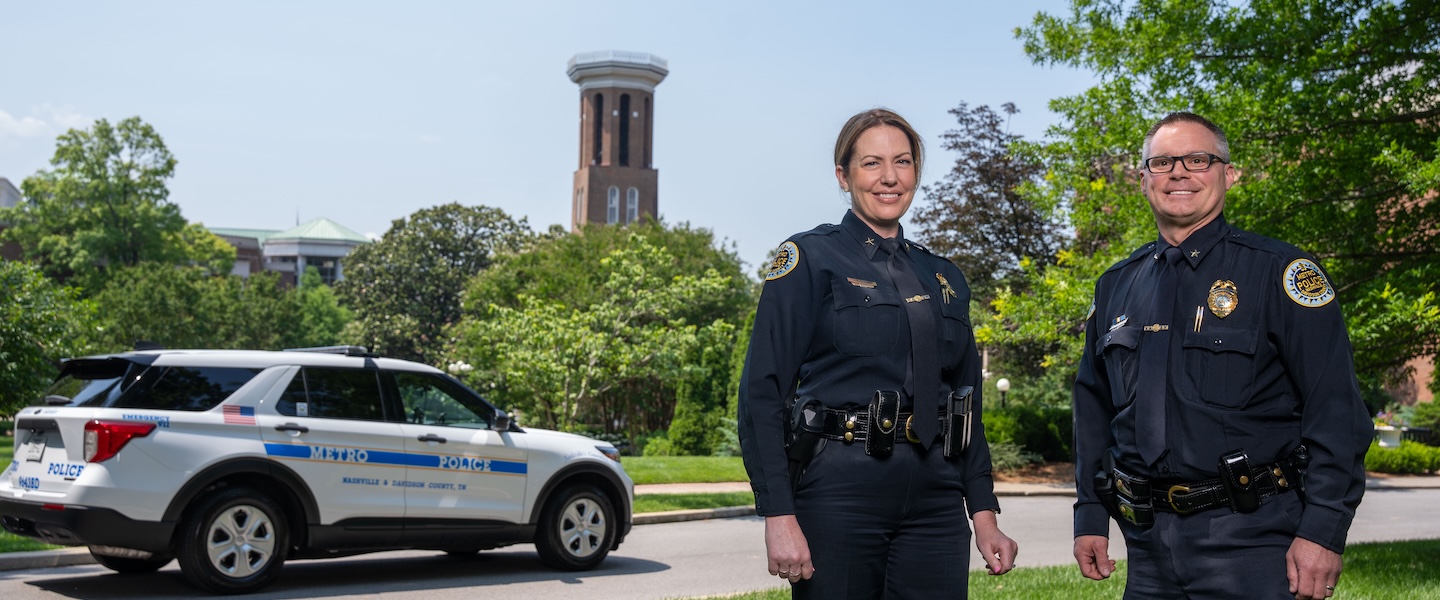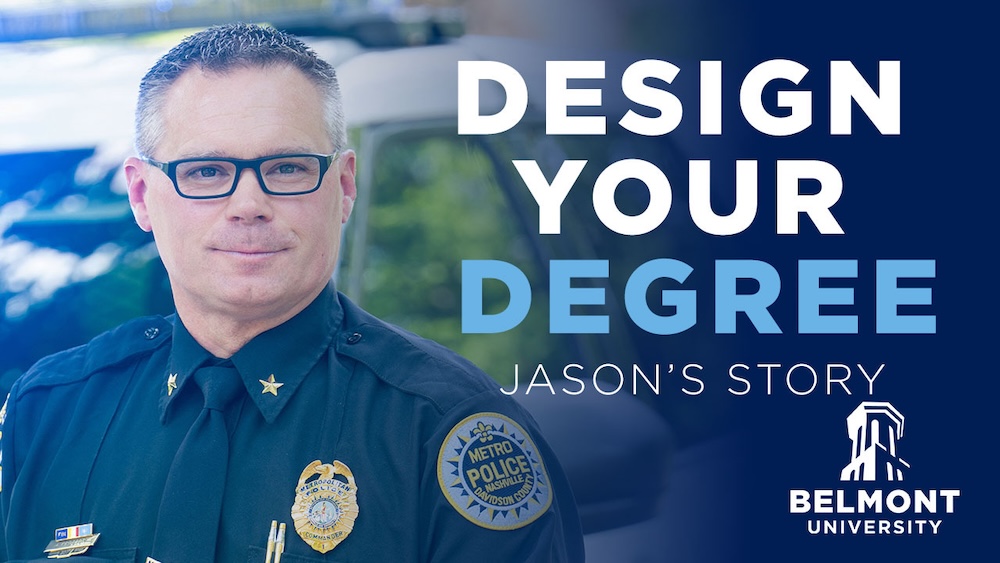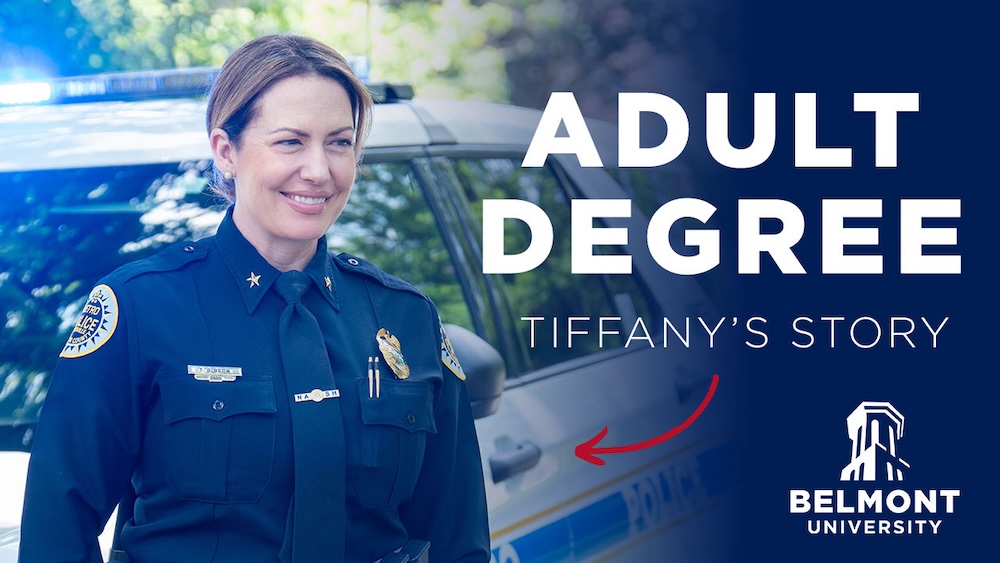Metro Nashville Police commanders credit their Liberal Studies education with preparing them for law enforcement leadership
Commander Tiffany Gibson stands before a room of police recruits, drawing on communication skills she honed in Belmont University classrooms more than 15 years ago. Across town, Commander Jason Proctor applies ethics-based leadership principles he learned as a Belmont baseball player to guide his West Precinct officers through daily challenges.
Both Metro Nashville Police Department (MNPD) commanders credit their Liberal Studies degrees from Belmont's Adult Degree Program with providing the foundation for their successful law enforcement careers — and their recent promotions to leadership roles within one of the South's largest police departments.
"The skill I found most valuable from my studies was communication," said Gibson, who graduated in 2009 and now leads MNPD's Training Division. "That's a lot of what I do — communicate with client agencies, outside agencies, the state. We have to make sure we're complying with all the policies and state laws. So it's been really helpful."
Building Leadership Through Liberal Studies
Belmont's Liberal Studies program allows students to design their own major by combining coursework from multiple disciplines. Working with academic advisors, students create personalized degree plans that build on previously earned credits while targeting specific career goals and interests. The program is particularly suited for working adults who need flexibility and those transferring credits from multiple subject areas.
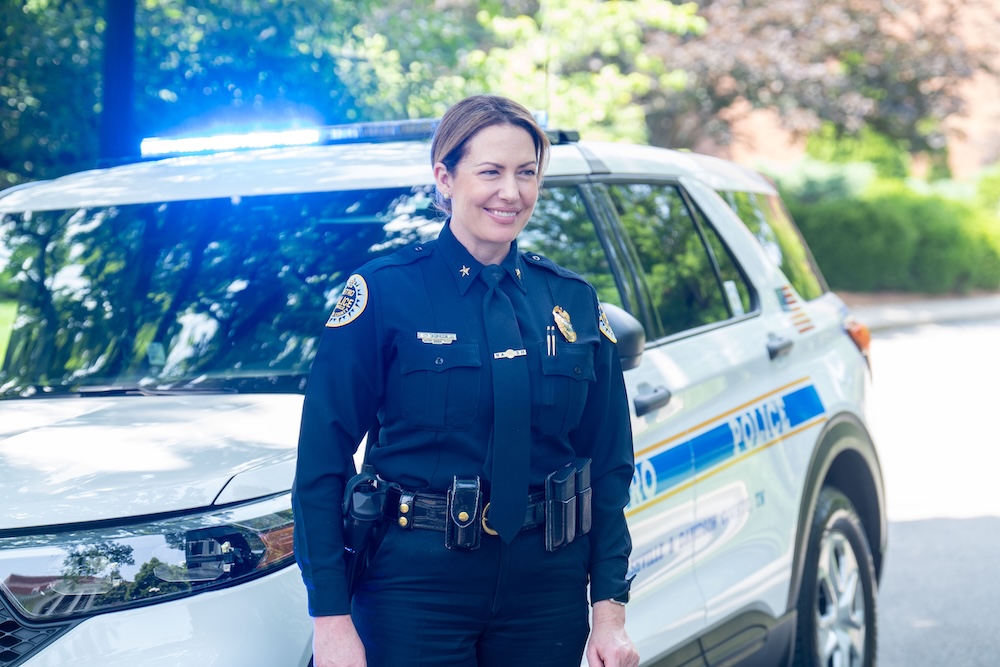 Gibson's path to law enforcement leadership began in California, where she was working full time while attending CSU Stanislaus. When she transferred to Nashville, she found Belmont's Adult Degree Program offered the flexibility she needed to complete her education.
Gibson's path to law enforcement leadership began in California, where she was working full time while attending CSU Stanislaus. When she transferred to Nashville, she found Belmont's Adult Degree Program offered the flexibility she needed to complete her education.
"I was working full time and going to school, and Belmont was really great about working with me," Gibson said. "I took most of my classes in the evenings. I was able to get my degree and graduate quickly. I even went to summer school and took classes after my shift — I was working midnights. It was a great program."
The Liberal Studies/self-design major allowed Gibson to customize her coursework around her career goals while building on credits she'd already earned. Working with an academic advisor, she designed a degree plan that emphasized communication and leadership skills.
"My academic advisor was very instrumental in helping me," Gibson said. "She showed me all the options and helped me design my program. We worked together so I could understand what was available, when it was offered and the flexibility I had."
Proctor's journey followed a similar path, though he came to Belmont straight from high school as a baseball player before transitioning to the Adult Degree Program's Liberal Studies major.
"Belmont created an ethics-based leadership model," Proctor said. "Some of the key components that Belmont helped me develop were leadership principles built on transparency and accountability — the same skill sets we use in our community policing model today."
From Classroom to Crime Scene
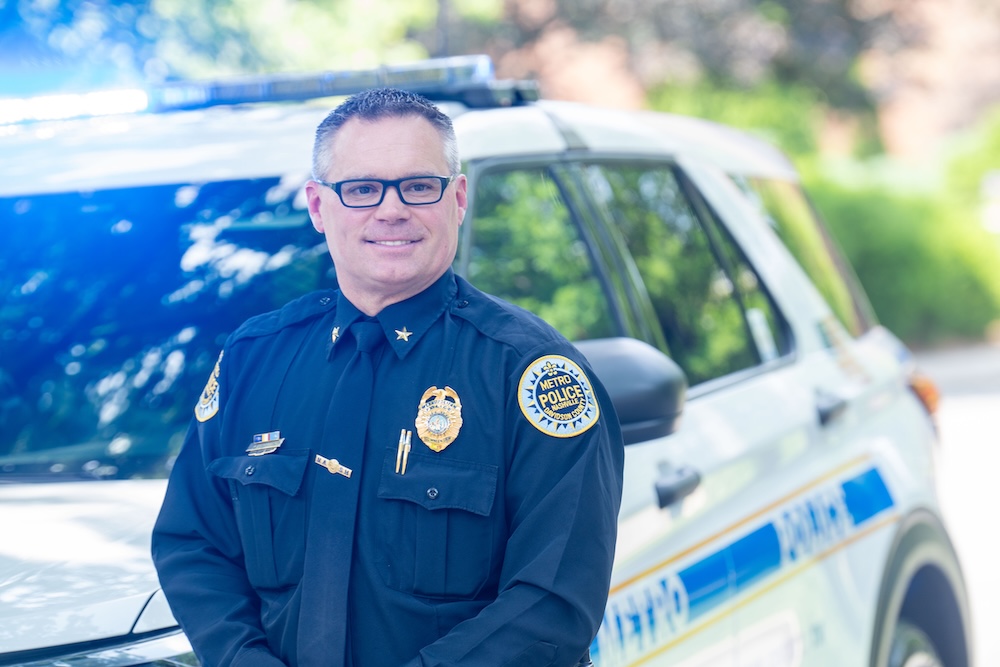 After graduating in 2000, Proctor went directly into the police academy, beginning his MNPD career on the midnight shift in East Nashville in November 2001. Within three years, he'd advanced to detective, where he discovered how his Belmont education had prepared him for the demands of criminal investigation.
After graduating in 2000, Proctor went directly into the police academy, beginning his MNPD career on the midnight shift in East Nashville in November 2001. Within three years, he'd advanced to detective, where he discovered how his Belmont education had prepared him for the demands of criminal investigation.
"That's really where I started seeing the skills I learned at Belmont pay off as a detective," Proctor said. "I was working with victims of crime, trying to get them the closure they needed. But I was also writing reports daily, affidavits and search warrants — things I would have to testify about later in court and articulate clearly."
The writing and critical thinking skills developed through his Liberal Studies coursework proved invaluable. "Belmont helped prepare me for those responsibilities," he said. "The attention to detail needed when describing specifics for a search warrant and being able to articulate that clearly."
Design Your Degree
Cultural Competency in Community Policing
Both commanders emphasized how their Belmont education prepared them to work effectively with Nashville's diverse communities — a critical skill in modern law enforcement.
Gibson recalled a course that opened her eyes to Nashville's cultural diversity. "I remember taking a world religion course that was really interesting," she said. "We visited different churches and synagogues around town, and I didn't realize Nashville was such a diverse place. That was really helpful to see the different cultures around town."
Proctor learned to navigate cultural differences that would prove essential in police work. "What we learned on campus — being out in front of things, learning how to deal with different cultural aspects and different communities," he said. "We work with a lot of different people, whether they're victims or suspects. We're working with them on their worst days, and we need to relate with them so they feel comfortable enough to speak with us and relax, so we can get to the root of the problem."
These skills enable officers to make lasting connections with community members. "We can make a real impact and difference in their lives," Proctor said. "That really connects with individuals and makes those differences where they come up and thank you — whether they're the suspect or the victim, they thank you for those encounters."
Adapting to a Changing Profession
During their decades of service, both commanders have witnessed dramatic changes in law enforcement. Proctor, who began his career when officers carried pagers and used payphones, has seen technology revolutionize police work.
"Since 2001, we've seen the technology age really transform law enforcement," he said. "Now we have technology right at our fingertips — video evidence, license plate reader systems, body-worn cameras, in-car cameras. Everything we need is right there."
More significantly, both leaders have seen law enforcement's role expand beyond traditional crime-fighting to address broader social issues.
"Law enforcement is no longer just about enforcing the law," Proctor explained. "We're here to help with all of society's issues. Not only are we targeting criminal activities, but we're also trying to reach people when they have traumas. How can we get them to that next stage in their recovery?"
This evolution has created new career opportunities within law enforcement. "We've really expanded the degrees and opportunities that a career in law enforcement can provide," Proctor said, noting roles for criminal analysts, mental health specialists and community engagement professionals.
Adult Degree
Leading with Purpose
As commanders, both Gibson and Proctor draw on leadership principles developed during their time at Belmont. Gibson, who has led the Training Division for more than two years, emphasizes collaboration.
"I think the leadership skills I learned at Belmont helped prepare me for this role," she said. "I cannot take credit for anything individually. We really stress the team environment, and it takes all of us to get it done. I have an amazing team and amazing staff, and they do a great job. That's how we've been able to be successful."
Proctor applies ethics-based leadership principles to guide his precinct operations. "The leadership skills, the ethics-based, values-based foundation I learned at Belmont, those communication skills and how to get those back into the community — that definitely played a role," he said.
Both commanders can respond to high-stress situations with the empathy and critical thinking skills Belmont emphasized. "Being able to respond to those situations with sympathy and empathy, and really use those critical thinking skills that Belmont provides — working with individuals in fast-paced situations, meeting them where they are and giving them the services and compassion they need during those times," Proctor said. "It was an invaluable skill set."
Advice for Aspiring Officers
For current students considering law enforcement careers, Gibson offers straightforward counsel: "My advice for current students trying to pursue a career in law enforcement would be to be honest and to have a service heart and really know your why — why you want to do this. It is a tough job. It's a very rewarding job. But you really need to know your why to stay grounded and focused."
Both commanders appreciate their ongoing connection to Belmont and the University's support for the Nashville community. "Seeing how much growth has occurred and how we've been able to sustain that growth over the last 25 years, as well as Belmont being a great partner throughout my 25 years of law enforcement to the Nashville community and the neighborhood, is remarkable," Proctor said.
Gibson shares similar sentiments about returning to campus. "The campus has always been beautiful," she said. "I love every chance I get to come back."
Ready to design your own path to success?
Belmont University's Adult Degree Program offers working professionals the chance to earn a bachelor's degree that fits their career goals.

